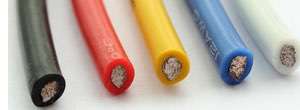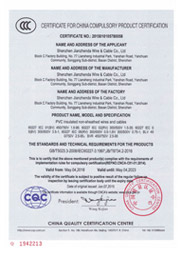 Author: Joey
Author: Joey  November 13,2021
November 13,2021
I believe that our purchasers have a lot of questions when choosing to buy silicone cables. This article aims to provide you with more knowledge about silicone wire and a comparison with other cables to help you better understand silicone cables and help this article can help you a lot.

Maybe someone usually considers the silicone wire and rubber cable are the same, but actually they have very apparent differences.
The silicone wire uses silicone rubber as an insulating material, which is a single-component room temperature vulcanized liquid rubber.
Once exposed to the air, the silane monomers in it will condense to form a network structure, the system is cross-linked, can not melt and dissolve, is elastic, becomes rubbery, and binds objects at the same time. Its thermal conductivity is slightly higher than that of ordinary rubber. Once cured, it is difficult to separate the bonded objects.
The insulating material of the rubber wire is rubber, which is a highly elastic polymer compound. Including unvulcanized and vulcanized varieties. It can be divided into two categories: natural rubber and synthetic rubber. Natural rubber is processed from latex obtained from rubber plants. Synthetic rubber is made by polymerization or suicide polymerization of monomers. Unvulcanized rubber is commonly called raw rubber or raw rubber. Vulcanized rubber is called vulcanized rubber, commonly known as cooked rubber or rubber. It is widely used in the manufacture of tires, hoses, tapes, insulating materials, rubber shoes, and other rubber products.
The rubber wire has strong flexibility, sun protection, water and oil resistance, temperature (90 degrees), cold resistance (-40 degrees), anti-ultraviolet (UV), anti-aging, and flame-retardant. The life expectancy is generally at least ten and eight years. It is suitable for outdoor lighting and household appliances with higher heat. The skin is rough and not smooth, such as frosted skin. The main feature of silicone wire is high temperature resistance, up to about 180 degrees, low temperature resistance up to about -65 degrees, smooth skin, and very soft thread quality. It is suitable for use on products with relatively high heat generation, most of which are used in the interior of products (car lighting, high-power lighting, medical machinery).
Mica tape is a high-performance mica insulation product with excellent high temperature resistance and combustion resistance.
The powder mica tape has good mulberry softness under normal conditions, and is suitable for the main fire-resistant insulation layer of various fire-resistant cables, and there is basically no harmful smoke volatilization when exposed to open flames, so this product is not only effective for cables, but also very safe.
Silicone wire, the industrial name is AGR silicone rubber wire, is a wire made of silicone material, the suitable temperature range is -60-200%, the voltage is 300/500v, the conductor material is tinned copper wire, the insulator is silicon rubber, braided The layer is glass fiber + silicone resin.
It can be seen that silicone wire and rubber wire can easily be mistaken for the same type of wire. In fact, there is a big difference in the performance and material of the two. It is recommended that people should pay attention to the characteristics of each wire and the difference between each other when choosing wires. Make a difference and avoid wrong choices.

After the cable is laid, it will be energized for a long time. Electricity will generate heat. The allowable working temperature of the conductor is 70°C, and the allowable long-term working temperature of the silicone wire is 180°C. In summer, the working temperature will rise, these temperatures will be emitted through the outer sheath, the thickness of the sheath will increase, and the heat energy will be difficult to dissipate, which will affect the service life of the cable. Under the action of heat, a series of physical and chemical changes occur to the insulating layer, which loses its original excellent performance, resulting in a significant decrease in insulation performance, and even a short circuit, which affects the normal operation of the unit.
PVC wire generally has a temperature resistance range of -15°C to 80°C, while silicone wire can reach a temperature range of -60°C to 200°C. The service life of PVC wire is shorter, generally about two years, and its flexibility is poor. The anti-aging performance is weak, and it is easy to crack under the sun. It is suitable for use in indoor lamps and household appliances. The PVC wire itself is relatively hard. Smooth surface and high brightness: V of the same specification is much cheaper than silicone wire, and its compressive strength is also lower than that of silicone wire. PVC wire has poor bending recovery ability. Once bent and folded, it is difficult to restore its original appearance. The silicone wire also has shortcomings, such as poor tear resistance of the sheath and high manufacturing cost.
Respective use
Silicone high-temperature wire is used in electric heating appliances, paint rooms, lighting equipment and household products, and lithium batteries. The Teflon high temperature wire is used in instrumentation, aerospace, electric power smelting, chemical industry, shipbuilding, vehicles, food machinery, household appliances drying room, etc.
The difference between high-temperature silicone wire and pvc wire, analyze their respective uses and functions between the two wires, to help you distinguish and understand high-temperature cables. The quality of the silicone wire can be seen from the appearance of the wire and cable at a glance. The appearance requirements of the silicone sheathed cable are smooth, round and uniform gloss, no visible debris, no mechanical damage, no flattening, no eccentricity (not exceeding the specified deviation), air bubble, slub shape and twist Shape and obvious particles, etc. It can be seen that the thickness of the sheath has a certain impact on the quality of the silicone wire and cable. And the thickness of the sheath is lower than the standard requirement, of course it is unqualified, and the thickness exceeds the standard requirement, it is also unqualified.
What are the harmful effects of the thickness of the silicone wire sheath on the use of wires and cables? Below i will answer this question for you.
(1) Problems with cable structure
Such as the conductor, insulation and braid density. It should be controlled in accordance with the requirements of the standard, and the appropriate filler should be selected to make it round.
(2) Material performance defects
The material performance is not reflected by the thickness, but in accordance with the standard requirements. If a certain index is not up to standard, it will directly affect the quality of silicone wire and cable.
(3) Increase the difficulty of cable laying
As the current cable laying is mainly based on bridges or pipes, and many companies are implementing tight cable requirements and small outer diameters. In the process of laying, there can be gaps and heat dissipation to ensure that the outer sheath of the cable is not damaged. Otherwise, it will bring certain difficulties to the construction unit and cable laying.
(4) Reduce service life
Silicone rubber is very different from ordinary. First of all, silicone rubber is thermosetting and will not melt. It can withstand high temperatures from 180 degrees to 200 degrees, and withstand low temperatures of 60 degrees. Ordinary wires are thermoplastic, which can reach a high temperature of 105 degrees, and if the temperature is higher, it is just like plastic. melted. Secondly, silicone rubber is softer, wear-resistant, tensile-resistant, and oil-resistant, and all conditions are better than ordinary ones. But if there is nothing special about the environment of your device, just use the general one. There is no need to use silicone rubber. Of course, the price of silicone rubber is a bit higher.
Now worldwide there are so many silicone wire manufacturers or trader when the silicone wire has been becoming more popular, when we wanna procure the silicone wire for our project, how do we choose? Now i will suggest some tips for you.
If you have more question about the silicone wire, you can contact us JZD Wire&Cable by our site in anytime, we will try our best to answer your questions or reply on your inquiry.
XLPE cable belongs to the flame retardant cable or fire rated cable?
Everything About A Good Silicone Insulated Wire Supplier In China
